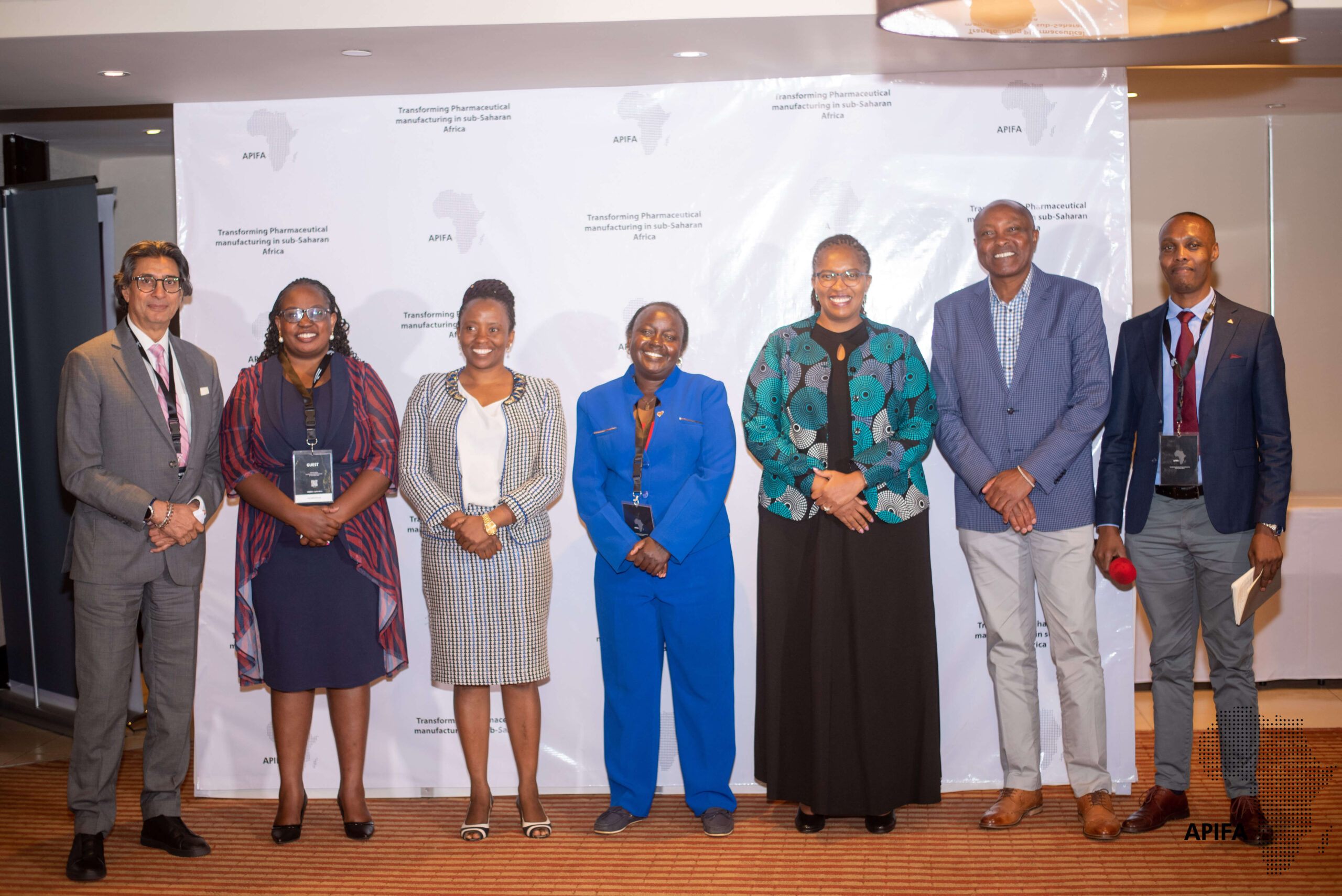
15 Dec Exploring the Opportunities and Challenges of Africa’s Local Pharmaceutical Manufacturing
On the 29th of November, 2022, API For Africa (APIFA) held its inaugural breakfast meeting for local pharmaceutical manufacturers at the Crowne Plaza Hotel in Nairobi. Themed Beyond the horizon: Innovatively scaling up local pharmaceutical production, the event brought together industry leaders and stakeholders who jointly engaged and answered questions on the global pharmaceutical market opportunities seen through the Kenyan lens and how to explore them. The Chief Guest was Kenya Medical Supplies Authority – KEMSA’s Chief Executive Officer, Ms. Terry K. Ramadhani.
Present at the event was APIFA’s Board Chairperson, Dr. Gerald Macharia, APIFA’s CEO, Dr. Frankline Keter, Head of HPT at the Ministry of Health, Dr. Nancy Njeru, Deputy Director of Industries, State Department for Industrialization, Hannah Muthoni Kiarie, the President of Pharmaceutical Society of Kenya (PSK), Dr. S. Louis Machogu, the Managing Director, Cosmos Cares and Chairperson Federation of Kenya Pharmaceutical Manufacturers, Dr. Vimal Patel, Mission for Essential Drugs and Supplies (MEDS), Head of Supply Chain, Dr. Gloria Kigen and other sector players.
Access to safe, effective, affordable, and quality medicines is an essential component of the right to health and is also one of the targets in the global development agenda, SDG3. Of all medicines consumed across sub-Saharan Africa, only 20-30% are produced locally. This is to say, Africa currently imports more than 80 percent of its pharmaceutical and medical consumables. Many African countries rely heavily on imported pharmaceuticals, which can make them vulnerable to price fluctuations and supply disruptions. Additionally, many imported drugs may not be tailored to the specific health needs of the population, and may not be affordable for many people.
APIFA Chief Executive Officer, Dr. Frankline Keter, said there is always a danger of Africa being left behind, especially when the tide changes. He noted that Africa needs to be self-sufficient and reduce dependence on imports as this will enable African countries to have more control over their own health systems, and be less reliant on external actors. This can improve the overall health and well-being of their populations.
“We must take up the challenge, leapfrog and enhance our local manufacturing capacity to meet the local pharmaceutical needs,” said Dr. Keter.
This heavy reliance on imported HPTs became a real point of vulnerability during the COVID-19 pandemic response, underwriting the urgent and critical need to scale up local production. During the breakfast meeting, the delegates acknowledged the importance of scaling up local production to not only enable local manufacturers to play their role in the attainment of UHC but also mitigate continent supply chain vulnerability against future pandemics while creating sustainable business opportunities.
Terry K. Ramadhani, the Chief Executive Officer at Kenya Medical Supplies Authority – KEMSA was confident that with a people-centered approach, it is possible for local manufacturers to produce high quality drugs at competitive prices.
“Vibrant local manufacturers are the answer to the hard lessons that COVID-19 taught us,” said KEMSA CEO, Terry Ramadhani.
APIFA Board Chairperson, Dr. Gerald Macharia, said that APIFA is and will continue to work with a multitude of critical stakeholders cutting across the private sector, public sector, research institutes, civil society, with a number of Development Finance Institutions (DFIs) including the European Investment Bank (EIB) to build local capacity and enhance local pharmaceutical production of active pharmaceutical ingredients (APIs) and other Health Products and Technologies (HPTs.)
“We need to think beyond the horizon and innovatively scale up local production by actively tapping into existing partnerships and opportunities,” said APIFA Board Chair, Dr. Gerald Macharia.
In conclusion, the development of local pharmaceutical manufacturing in Africa is a crucial. It is important for the region to continue to invest in its pharma by working to address the challenges that are currently hindering growth and adequately supporting local manufacturers. Follow APIFA on Instagram, Facebook, Twitter, and LinkedIn for more updates.



No Comments